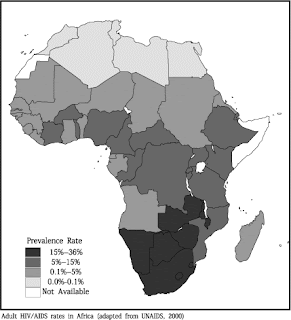International Women's Day was celebrated worldwide on March 8. Parades,
festivals, and exhibitions marked the pride and commemoration of women's daily contributions. While joy encompassed the majority of this day, it reminded the world of the unfortunate situation women are still in. Women represent
70% of the world's poor people. In order to reduce this number, women's issues, specifically gender inequality, must be more seriously addressed. The United Nations
Millennium Development Goals stresses this in one of its eight points claiming that in order to end poverty by 2015, countries must, "eliminate gender disparity in primary and secondary education, preferably by 2005, and at all levels by 2015." In light of International Women's Day, the Millennium Campaign publicized this goal to bring awareness to the poverty-stricken situation many women are in today (their image below). It serves as a reminder not only to commemorate contributions by women but also to address the inequality that keeps them from advancing out of poverty.

In most third world countries, women are far behind in economic development. Women in some Middle Eastern countries comprise of merely
18.3% of the total paid employment. Promoting equal employment has yet to be fully implemented by governments. Many women rely on micro-credit loans from international
organizations because their governments cannot provide them with jobs. The UN Secretary General
stated this is because governments lack a "political will" with insufficient budgets allocated to women.
Vedior, an international staffing service, claims that
women are "more likely than men to be employed in low-productivity, low-paid, and vulnerable jobs, with little protection or rights." While governments focus on increasing employment rates, they must include gender specific policies to ensure that women on the poverty line have an opportunity to beneficial and sustainable employment. Governments also fail to recognize that women with equal employment opportunities can have dramatically positive effects on that nation's economy. Although the United States is still behind in equal employment wages for women, a large majority of women are employed, which is a huge factor in the United State's economic improvements over the last decade. Employment is not the only obstacle for women living in poverty. They face domestic violence, lack of clean water, and the spread of AIDS.
International organizations have played a significant role in assisting with women's development.
UNIFEM (United Nations Development Fund for Women) offers finances to programs focused on women's empowerment and equality worldwide.
Amnesty International has a goal to end violence against women while promoting gender equality. On International Women's Day,
UNICEF (United Nations Children's Fund) promoted the importance of maternal health worldwide. They stated that better access to
maternal health can reduce up to half a million deaths related to pregnancy each year. Because so many women live in poverty, access to affordable medical treatment is not an option for them.
Women for Women International assists female survivors of war torn countries, providing them with economic sustainability. Although these organizational contributions have had an impact on women's progress, poverty has overall continued to rise.
The correlation between women's development and poverty is a vital connection governments fail to address. By addressing overall poverty without a major focus on women's development, poverty cannot be alleviated. Women comprise over half the world's population and are the primary caretakers for families, specifically children. Therefore, without a focus on the situation of women, children are therefore neglected as well. Young girls must also be a vital focus of governments in their poverty policies. Girls are often disadvantaged in education. In many developing countries, the
ratio of girls enrolled in school to boys ranges from 46-79 girls to 100 boys. An example is Benin, whose ratio of girls enrolled in secondary school to boys is 46 to 100. These low numbers are the root to the unfortunate situation women are in today. Without any education, it is virtually impossible for any woman to rise economically and live an independently comfortable life. In order for women's poverty to begin a steady decline, girls education must begin a dramatic incline.

Women marched the streets, performed, sang, danced, and spoke to mark their presence in this world (see left). They demanded to be heard and seen, understood and appreciated. It is time for governments to respond. There is so much international organizations like the UN and Amnesty International can do in raising awareness, but governments are the sole implementers in being able to improve women's situations worldwide. Policies to focus on equal employment rates and opportunities, cracking down on domestic violence, ensuring education and health care are feasible through a reorganization of government funding in new gender specific programs. In order to meet the Millennium Development Goals, women's issues must be addressed seriously to alleviate poverty worldwide. Through addressing these goals, child mortality will decrease as well as the increase in orphans. The spread of AIDS can slow down, and economies can rise with a new educated working class of women. International Women's Day must not be a once-a-year reminder to women's situations but solely a celebration of progress in the advancement of women worldwide. With a more serious effort by governments in focusing on women's progress, this can be achieved.
 to date on an hourly hunger death statistic effect it provides. Although its content is rather brief, it gives overviews on leading poverty issues as well as a useful statistics chart on international aid.
to date on an hourly hunger death statistic effect it provides. Although its content is rather brief, it gives overviews on leading poverty issues as well as a useful statistics chart on international aid.






